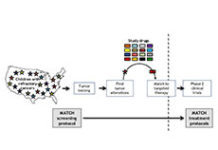
Photographer: John Nicholson
In what feels like the blink of an eye, we’re almost at the end of January.
And with each passing day, were getting closer to a significant milestone for the charity. February 4th marks 20 years since Cancer Research UK was formed, but our history goes back much further, to 1902, with the founding of the Imperial Cancer Research Fund. This year will also mark 120 years of life-saving discoveries.
It’s a chance for us to reflect on the incredible advances we’ve made over that time, and to celebrate the role that researchers, supporters, volunteers, partners and staff have all played in making that possible.
It’s also a reminder of how much we have left to achieve. And the increasingly complex space we’re having to work in.
A health service under pressure
The latest NHS England figures paint a bleak but sadly familiar picture. While the service is seeing record numbers of cancers, performance on key targets is among the worst of record. The number of people seen within 2 weeks of an urgent referral fell below 80% for the first time.
Health professionals have never worked harder – but even so, the scars of the pandemic will unfortunately linger for some time. Even if the Government does invest in the cancer workforce, as it has promised to, it will sadly take time for pressures to reduce.
But in the meantime, there are still ways we can make this situation better. During the pandemic we’ve seen a spirit of innovation in the NHS, which has kept services running even through the worst months – and this must continue.
In 2022 – just as in 2020 and 2021 – one of our highest priorities will be keeping cancer high on the agenda and pushing for change.
We’ll never stop being a voice for people affected by cancer – whether that’s through campaigning to keep cancer high on the agenda, highlighting cancer inequalities, or supporting people through our information, news, Cancer Awareness Roadshow and nurse helpline.
Tough decisions for our research
We also continue to see the impact that the pandemic has had on our research – whether that’s through clinical trials being slow to restart, or the major challenges COVID-19 has posed to our finances.
I’m proud to say we remain the largest independent funder of cancer research globally, but we’re sadly still funding at a lower level than we were pre-pandemic.
While adapting to this lower level of funding, we’re continuing to do everything we can to minimise the impacts of cuts, limit damage to researchers’ careers and seize opportunities to work more collaboratively and effectively.
This approach is evident in how we’ll fund our Centres for the next 5 years. Our Centres provide vital infrastructure for researchers – paying for some staff and facilities as well as training PhD students.
We’ve just announced that we’ll be investing £100 million in 7 centres across the UK over the next 5 years. It’s a third less than we were able to invest in 2017, but will continue to provide vital support structure to help move discoveries from the lab into the clinic, as well as creating opportunities for the next generation of scientists.
Forging ahead
Despite the hurdles of the past 2 years, I look to 2022 with a sense of cautious optimism.
Each year, we reap the benefits of research we’ve funded in years gone by. From proving the link between smoking and cancer to laying the foundations for modern radiotherapy – our scientists have been at the forefront of cancer research for 120 years.
And we’re not stopping now. Just last year, our research confirmed that the UK HPV (Human papillomavirus) vaccination programme reduced cervical cancer rates by almost 90%.
I have no doubt that 2022 will bring equally exciting findings.
We’ll also continue to fund world-class research this year – sowing the seeds for more breakthroughs in the decades to come – including the announcement of our next round of Cancer Grand Challenges teams in the spring.
2022 will see us launch a new strategy. Our understanding of cancer has grown immeasurably over recent years, and we’re evolving our approach with it. We are still dedicated to saving lives through research, influence and information, and we’ll continue to be the world’s largest independent funder of charitable research. However, we need to keep adapting and growing if we are to make the progress that people affected by cancer deserve.
And while no-one would have picked the last 2 years, I’m proud of how we’ve adapted. I see colleagues, volunteers and partners stepping up every day, driven to do more, to build a brighter future for people affected by cancer. It’s a reminder of just how powerful we are when we work together.
I can’t wait to see the progress we’ll make in 2022.
Michelle Mitchell is Cancer Research UK’s chief executive









